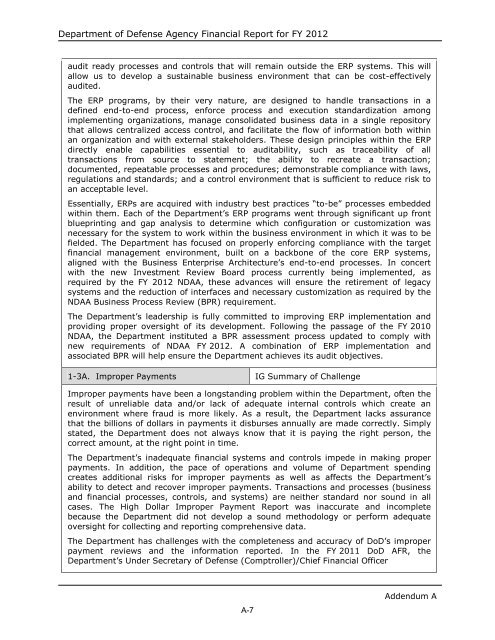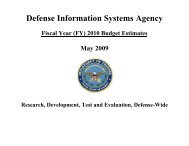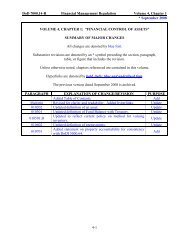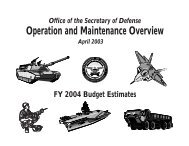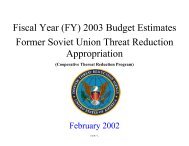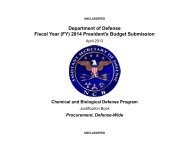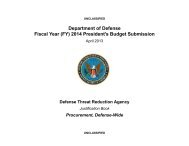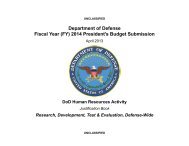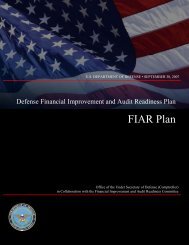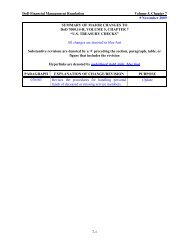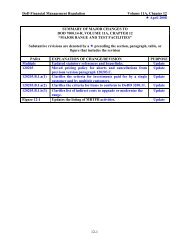department of defense agency financial report fiscal year 2012
department of defense agency financial report fiscal year 2012
department of defense agency financial report fiscal year 2012
Create successful ePaper yourself
Turn your PDF publications into a flip-book with our unique Google optimized e-Paper software.
Department <strong>of</strong> Defense Agency Financial Report for FY <strong>2012</strong><br />
audit ready processes and controls that will remain outside the ERP systems. This will<br />
allow us to develop a sustainable business environment that can be cost-effectively<br />
audited.<br />
The ERP programs, by their very nature, are designed to handle transactions in a<br />
defined end-to-end process, enforce process and execution standardization among<br />
implementing organizations, manage consolidated business data in a single repository<br />
that allows centralized access control, and facilitate the flow <strong>of</strong> information both within<br />
an organization and with external stakeholders. These design principles within the ERP<br />
directly enable capabilities essential to auditability, such as traceability <strong>of</strong> all<br />
transactions from source to statement; the ability to recreate a transaction;<br />
documented, repeatable processes and procedures; demonstrable compliance with laws,<br />
regulations and standards; and a control environment that is sufficient to reduce risk to<br />
an acceptable level.<br />
Essentially, ERPs are acquired with industry best practices “to-be” processes embedded<br />
within them. Each <strong>of</strong> the Department’s ERP programs went through significant up front<br />
blueprinting and gap analysis to determine which configuration or customization was<br />
necessary for the system to work within the business environment in which it was to be<br />
fielded. The Department has focused on properly enforcing compliance with the target<br />
<strong>financial</strong> management environment, built on a backbone <strong>of</strong> the core ERP systems,<br />
aligned with the Business Enterprise Architecture’s end-to-end processes. In concert<br />
with the new Investment Review Board process currently being implemented, as<br />
required by the FY <strong>2012</strong> NDAA, these advances will ensure the retirement <strong>of</strong> legacy<br />
systems and the reduction <strong>of</strong> interfaces and necessary customization as required by the<br />
NDAA Business Process Review (BPR) requirement.<br />
The Department’s leadership is fully committed to improving ERP implementation and<br />
providing proper oversight <strong>of</strong> its development. Following the passage <strong>of</strong> the FY 2010<br />
NDAA, the Department instituted a BPR assessment process updated to comply with<br />
new requirements <strong>of</strong> NDAA FY <strong>2012</strong>. A combination <strong>of</strong> ERP implementation and<br />
associated BPR will help ensure the Department achieves its audit objectives.<br />
1-3A. Improper Payments IG Summary <strong>of</strong> Challenge<br />
Improper payments have been a longstanding problem within the Department, <strong>of</strong>ten the<br />
result <strong>of</strong> unreliable data and/or lack <strong>of</strong> adequate internal controls which create an<br />
environment where fraud is more likely. As a result, the Department lacks assurance<br />
that the billions <strong>of</strong> dollars in payments it disburses annually are made correctly. Simply<br />
stated, the Department does not always know that it is paying the right person, the<br />
correct amount, at the right point in time.<br />
The Department’s inadequate <strong>financial</strong> systems and controls impede in making proper<br />
payments. In addition, the pace <strong>of</strong> operations and volume <strong>of</strong> Department spending<br />
creates additional risks for improper payments as well as affects the Department’s<br />
ability to detect and recover improper payments. Transactions and processes (business<br />
and <strong>financial</strong> processes, controls, and systems) are neither standard nor sound in all<br />
cases. The High Dollar Improper Payment Report was inaccurate and incomplete<br />
because the Department did not develop a sound methodology or perform adequate<br />
oversight for collecting and <strong>report</strong>ing comprehensive data.<br />
The Department has challenges with the completeness and accuracy <strong>of</strong> DoD’s improper<br />
payment reviews and the information <strong>report</strong>ed. In the FY 2011 DoD AFR, the<br />
Department’s Under Secretary <strong>of</strong> Defense (Comptroller)/Chief Financial Officer<br />
A-7<br />
Addendum A


